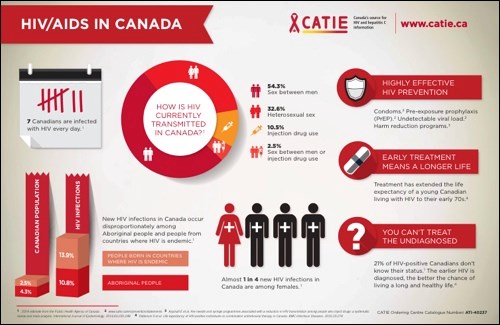Saskatchewan Health – The Saskatchewan Health Authority (SHA) has seen an increasing number of human immunodeficiency virus (HIV) and infectious syphilis cases in recent months in northwest Saskatchewan.
An HIV outbreak has been declared for North Battleford, primarily among people who inject drugs and share needles and other injection drug use equipment. HIV is also spread from person to person through unprotected sexual activity.
A syphilis outbreak has been declared for the areas of the former health region, particularly the Battlefords and Lloydminster areas. Syphilis is a sexually transmitted infection that is spread from person to person through direct contact with a syphilis sore.
An outbreak may be declared when more cases of disease than expected occur in a given area or among a specific group of people over a particular period of time. In North Battleford between 2013 and 2018, an average of four new HIV cases were reported annually. From January to the end of May 2019, 15 new cases were reported.
In the former health region that included The Battlefords, Lloydminster and areas, fewer than seven new cases of syphilis have been recorded annually. From January to the end of May 2019, 42 cases have occurred. The numbers of cases are subject to change, based on ongoing testing.
The vast majority of persons who get HIV often have no symptoms. For syphilis and other sexually transmitted infections, many infected people have no symptoms.
“We want the public to be aware of the risks associated with these infections, and how they can be prevented and treated,” said Dr. Mandiangu Nsungu, Medical Health Officer (MHO) Area Lead North with the Saskatchewan Health Authority.
“HIV and syphilis are treatable diseases. It is important that individuals who are sexually active know their own status for HIV and syphilis. Knowing your status means that treatment can be provided and individuals can be helped to reduce the risk of spreading the illness.”
A multi-jurisdictional, multi-disciplinary team is providing a coordinated, integrated response in these communities. The team includes health professionals from Saskatchewan Health Authority, the Ministry of Health, Battle River Treaty 6 Health Services, and Indigenous Services Canada-Saskatchewan region. The response is focused on testing, treatment and connecting persons to health and support services to reduce their risks.
Testing is free and confidential. Treatment will be offered immediately. Anyone can request testing to learn their HIV and sexual health status by visiting their physician or nurse practitioner, or by attending a walk-in or sexual health clinic. If necessary, individuals may visit a hospital emergency department for testing.
For more information, visit SHA's public alerts page, the Government of Saskatchewan's website or contact your physician, nurse practitioner or local public health office.




